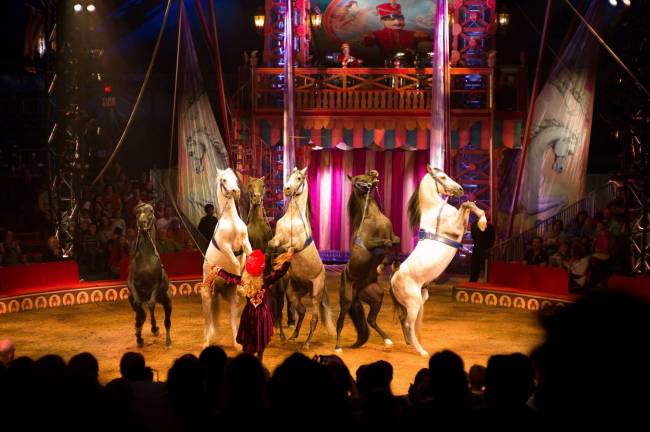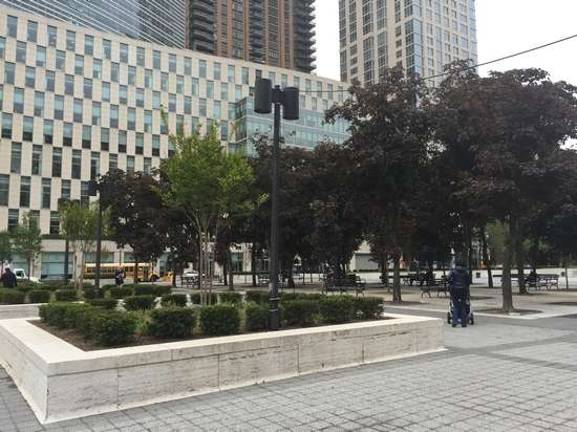Public Pressure Mounts Over Use of Damrosch Park for Circus


The Parks Department and Lincoln Center face community pressure over a controversial deal permitting the Big Apple Circus, recently reconstituted as a for-profit business, to occupy much of Damrosch Park for months at a time over the next decade. City Council Member Helen Rosenthal, Community Board 7, neighbors and parks advocacy groups have publicly expressed concern about the deal in recent weeks, as the Big Apple Circus nears the date of its first scheduled performance at the park on Oct. 27.
Damrosch Park, a 2.4-acre plaza adjacent to Lincoln Center, is a city-owned public park that is operated and managed by Lincoln Center pursuant to a license agreement with the Parks Department. The current license agreement is set to expire in 2020. Lincoln Center hosts programming in the park throughout the year and occasionally enters into sublicense agreements permitting other organizations to hold events in the space.
Damrosch Park hosted the Big Apple Circus for decades until last year, when the circus, which had long operated as a non-profit, declared bankruptcy and cancelled its scheduled shows at the venue. The bankrupt circus was subsequently bought at auction by a Florida-based investment firm and relaunched as a for-profit business. In March, the reconstituted Big Apple Circus signed a new contract with Lincoln Center permitting the circus to pitch its tents in Damrosch Park from October 8 to February 1 for the next 10 years.
Community Board 7 chair Roberta Semer and Klari Neuwelt, chair of the community board’s parks and environment committee, sent a letter to the Parks Department on September 12 to “express strong concerns” about the new agreement with the reconstituted circus, citing “policy concerns about the lack of public process and transparency surrounding the sublicense to this new entity.”
Central among the concerns outlined in the letter is the lack of consultation with the community board before the new agreement was signed. According to the community board’s letter, “the transition from the old Big Apple Circus to the new for-profit entity was done without public input and without transparency.”
The financial terms of Lincoln Center’s agreement with Big Apple Circus were redacted in the copy of the contract provided to the Parks Department, leaving it unclear how much revenue the performing arts venue would earn for the use of the space. “We see no justification for this lack of transparency regarding those revenues,” the community board’s letter states.
Since Lincoln Center is required to report its park-related revenue to the Parks Department each year, the letter states, it “seems incongruous” that the financial terms of the circus agreement should be kept secret from the Parks Department and public. (Under Lincoln Center’s agreement with the Parks Department, such revenue is required to be dedicated to maintaining Damrosch Park and the surrounding public spaces owned by Lincoln Center.)
Representatives of Lincoln Center and the Parks Department have said that circuses, regardless of their for-profit or non-profit status, are an appropriate use of public park land. Critics have countered that the Big Apple Circus will occupy nearly all of Damrosch Park for several months, distinguishing this case, they say, from examples of other for-profit events that might use a small fraction of a larger park.
In its letter, the community board acknowledged that some for-profit entities, such as food concessions, are permitted to operate in public parks, but noted that “such operations do not take up the entire space of a park, or anything like it.”
Additionally, the plaintiffs in a lawsuit that led to a 2014 legal settlement regarding the use of Damrosch Park allege that Lincoln Center and the Parks Department have failed to fulfill the terms of the agreement. The lawsuit was filed by community groups and parks advocates in response to the use of Damrosch Park for Fashion Week, which was held in the park for several years, and which they claimed was an inappropriate non-park use of the space and violated the state’s Public Trust Doctrine, a common-law standard that holds that parkland exists for the benefit of the public at large, not just for some.
The lawsuit was eventually settled and Fashion Week was relocated. Lincoln Center and the city stated in the settlement agreement, among other stipulations, their intention “to further expand public access to the Park by not entering into agreements for commercial events substantially similar in nature, size and duration to Fashion Week and for which access is not generally available to the public.” Lincoln Center and the city further stated that they “share the goal of continuing to make Damrosch Park a lively resource for public recreation and other park-related uses and recognize that special events that limit public access to substantially all of Damrosch Park should be the exception rather than the norm.”
On September 19, the plaintiffs sent a letter to the city and Lincoln Center stating their belief that “the new Big Apple Circus operation in the Park is inconsistent with that goal and that recognition.”
The plaintiffs echoed the community board’s criticisms regarding the lack of public dialogue before the new circus agreement was signed, which they say was required under the terms of the settlement. Lincoln Center claims that the requirement applied narrowly to a landscaping plan agreed to in the settlement and was fully met.
The plaintiffs’ letter also notes that Lincoln Center’s new sublicense agreement with Big Apple Circus, which runs through 2027, extends well past the term of Lincoln Center’s current license agreement with the city permitting it to manage Damrosch Park, which expires in 2020.
The plaintiffs asked in the letter that Lincoln Center disclose the redacted financial terms and schedule a meeting with the community board, among other requests.
Helen Rosenthal, the city council representative whose district includes the park, has vowed to use her position as chair of the council’s contracts committee to look into whether the terms of the settlement are being met.